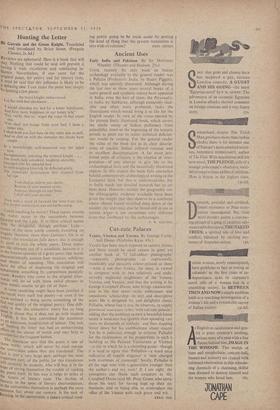Hunting the Letter
REVIEWS are ephemeral. Here is a book that will itay. Nothing that could be said will prevent it having a wide circulation and continuing in- fluence. Nevertheless, if one cares for the original poem, for poetry and for literary taste, it must be said that this influence is likely to be a debasing one. I can make the point best simply by quoting a few pieces : , • • . the brave knight, embarrassed,
would abandon my bed for a better habiliment, And have more happiness in our honey talk.' 'Nay, verily. fine sir,' urged the voice of that sweet One, 'You shall not budge from your bed. T have a better idea.
shall hold you fast here on this other side as well,
• And so chat on with the chevalier my chains have caught . .
In a bewitchingly well-mannered way she ogled him, Surreptitiously soliciting the stalwart knight . .• . • The lovely lady advanced, laughing adorably,. Swooped over his splendid face . . . So with laughing love-talk he deflected gently The downright declarations that dropped from her lips . . .
'I am deep in debt to you, dame.
Because of your manner to me.
And ever through ice and flame
I shall stay your devotee . .
Then with a word of farewell she went from him. Por further satisfaction was not forthcoming.
Could anything be worse? These lapses, among the worst occur in the encounters between Gawain and the I .adv. If in these critical scenes With the de.lightlfil. thciugh perilous, I.ady- scenes of the most subtle comedy trembling on tragedy (because More than Gawain's life is at Stake)--the translation falls down, this is enough by itself to ruin the whole poem. These scenes are the ultimate test of a translator, because it is in the human episodes of a great poem that words characteristically assume finer nuances, subtleties and shades of meaning. This translation will have the effect of displacing the original and substituting something by comparison painfully crude. Readers who come to the original after- Wards will do so with Ihose awful phrases in their minds, unable to get rid of them. A verse rendering might have been justified it' the result were itself line poetry—or even if the ..verse assisted to bring across something of the reel and quality of the original poetry. One dilli- L‘ultY is that the alliterative metre has so long re en in disuse that it does not go with modern ilgilsh• It has here committed the translator i,s ' „."„ an enormous misdirection of labour. The task "it 'hunting the letter' has had an embarrassing ey eet on the choice of words and may help to account for the frequent bathos. The translator says that the poem is one of those works 'which will never be read outside the universities unless they are translated.' The fact is that a very large part, perhaps the most Important part, of the public for this translation certainly be students. who will buy it in the hope of saving themselves the trouble of reading the poem itself. In this way it helps to strike at .the future of literary taste. The decline of literacy, in the sense of literary discrimination. In the universities themselves is perhaps the most o_minous fact about our century. Is the task of forming, in the universities, a future critical read- 1-4 flat with tine adroitness . . .
ing public going to be made easier by putting the kind of thing that the present translation is


































 Previous page
Previous page